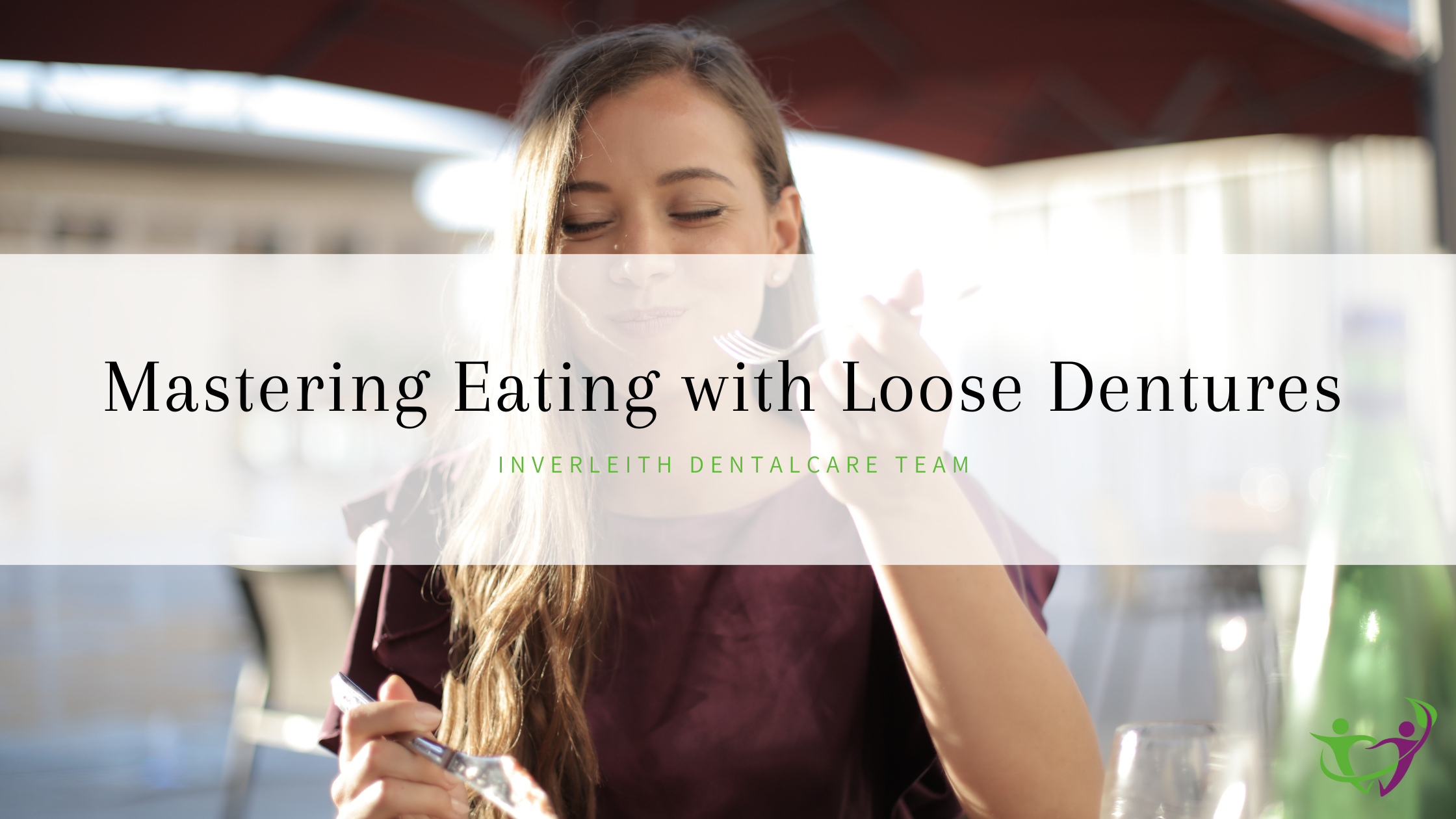Dealing with loose dentures can be frustrating and impact your ability to enjoy meals. If you’re struggling with this issue, don’t worry! In this comprehensive guide, we will provide you with practical tips and insights on how to eat with loose dentures. By following these strategies, you can regain confidence in your dining experience and savour your favourite foods once again.
Adapt Your Diet. One of the first steps in managing loose dentures is adapting your diet to ensure comfortable eating. Consider the following dietary modifications:
- Opt for softer foods: Focus on incorporating soft, easy-to-chew foods into your meals. Cooked vegetables, tender meats, fish, eggs, yogurt, and soft fruits can be excellent options.
- Cut food into smaller pieces: By cutting your food into smaller, manageable portions, you can minimize the strain on your dentures while eating. Sometimes it is suggested that you should drink fluids at the same time as when eating. This has a tendency to dilute the effect of you digestive enzymes and is not advisable.
- Avoid sticky or hard foods: Steer clear of sticky candies, tough meats, hard nuts, and chewy bread, as they can exert excessive pressure on your dentures. Failing to chew properly leads to large morsels of food being swallowed. Your digestive system then needs to work harder to break these down and attempt to extract the nutrients. This can lead to whole set of other issues such as digestive issues, illness due to vitamin depletion and weakness.
Enhance Denture Fit. Improving the fit of your dentures is crucial for comfortable eating. Try these suggestions to enhance the stability and reduce movement of your dentures:
- Dental adhesive: Consider using dental adhesive products recommended by your dentist. These can provide additional grip and stability to your dentures.
- Denture realignment: Schedule an appointment with your dentist to evaluate the fit of your dentures. They may recommend adjustments or relining to improve the overall fit and reduce slippage. If appropriate, your dentist can take an impression inside the denture and send it to a denture lab to make a new fitting surface. This is similar to resoling old shoes.
- New Dentures – Dentures are like shoes: no matter how comfortable they are, you should still be changing or rebasing them every five years. Why? As you age your adaption to new dentures becomes more challenging. If you have worn the same denture for 10-20 years you might struggle when you need a new denture. Small changes are easier to accept.
We offer a range of denture services depending on what solution is right for you. Explore the options here.

Whilst the natural teeth are present the jawbone continuously replaces itself through stimulation. When the teeth are lost the jawbone begins to wither away. With dentures in place this wear is accelerated. If you are considering implants, it is much easier to do it in stage two than three as there is an abundance of bone.
If you have lost a lot of bone there are special techniques to make dentures such as the one you can see below, called suction dentures. In most people these can markedly improve the fit of slack dentures.

Implant-supported dentures: In severe cases of loose dentures, your dentist may suggest implant-supported dentures. These are anchored to dental implants surgically placed in your jawbone, providing a more secure and stable fit. Most often these procedures are minimally invasive and easier than what you would think. The life enhancement afterwards can be profound.


Maintain Oral Hygiene. Proper oral hygiene is essential to prevent complications associated with loose dentures. Follow these guidelines for maintaining a healthy oral environment:
- Clean your dentures thoroughly: Remove and clean your dentures daily with a denture brush or a soft-bristled toothbrush. Use a denture cleaner or mild soap and rinse them thoroughly to remove any residue.
- Brush your gums, tongue, and palate: Even with dentures, it’s important to keep your mouth clean. Use a soft-bristled toothbrush or a tongue scraper to gently clean your gums, tongue, and palate to remove plaque and bacteria.
- Visit your dentist regularly: Regular dental check-ups are crucial for assessing the condition of your dentures, evaluating the fit, and addressing any potential issues. Your dentist can also provide professional cleaning and recommend appropriate adjustments, if necessary.
Eating with loose dentures can be a challenge, but with the right strategies, you can overcome this hurdle and enjoy your meals once again. By adapting your diet, enhancing the fit of your dentures, and maintaining good oral hygiene, you can regain confidence and make eating a more comfortable experience. Remember, consulting with your dentist is crucial for personalised advice and professional guidance on managing loose dentures. So, take control of your dining experience and savour the joys of eating with ease and satisfaction!
Remember, for personalised advice and professional guidance on managing loose dentures, it’s important to consult with your dentist. They can assess your specific situation and provide tailored recommendations to meet your unique needs.
Book your appointment here!


